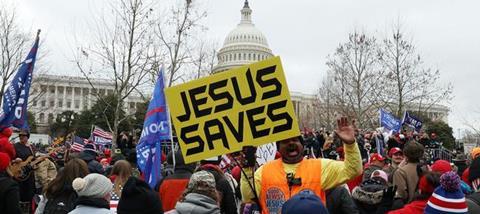
The invasion of the American Capitol was the climax of four years in which democratic norms have been under constant attack.
Among the Republican flags and star-spangled banners keen observers spotted Christian iconography. One flag read ‘JESUS SAVES’, others bore slogans like “Jesus is my Savior/Trump is my President”, “Proud American Christian”, ichthus symbols were also on display, a wooden cross was erected during the siege, and in a sea of MAGA hats, at least one read ‘GOD†GUNS/TRUMP.’
Ken Camp of Baptist Standard has drawn a sharp distinction between baleful ‘Christian nationalism’ and ‘honest-to-God biblical faith’. My feeling is that this distinction, while comforting, is hard to sustain. It also neglects the fact that at least some Christian leaders who came out against the insurrection have spent years ‘sewing the wind’ only to condemn the whirlwind.
The conviction that the Bible is the pre-eminent source of truth is central to evangelical theology. In theory, this provides a solid foundation. In practice its more complicated. The Bible requires interpretation. And evangelicals (along with other Christians) have interpreted scripture in a myriad of different ways. Since the American War of Independence white American protestants have appealed to the Bible to justify slavery and abolition, segregation and the fight for civil rights, egalitarianism and complementarianism (and the battle still rages on this last point).
Some white evangelical responses to Trump demonstrate just how easy and tempting it can be to pull verses out of context in order to further your own personal political viewpoint. For example, following Lance Wallnau many evangelicals have interpreted Isaiah 45 as a pro-Trump text. Trump, Wallnau argues, is a type of Cyrus the pagan King who worked as an instrument of divine deliverance. Others suggest that, Mike Pence is Daniel to Trump’s Nebuchadnezzar. The current pandemic has also demonstrated the interpretative creativity of white evangelicals. Worship leader Sean Feucht has used Christ's words in Matthew 18:20 - "For where two or three are gathered I am there with them" - to support holding rallies of thousands despite the clear and obvious risk to public health.
In the run up to the election, evangelist Mario Murillo published numerous prophesies containing eschatological conspiracy theories. For Murillo, the election was not a competition between two essentially legitimate political parties, it was the last chance to save the nation from "Marxist wolves". The Democrats, he prophesied would "wipe out both the First and Second Amendments to the Constitution" and marginalise Christians economically and socially. Public health measures and the Democrat’s election campaign were evidence that "Satan has been working on this masterstroke of tyranny for years." Murillo is hardly a voice in the wilderness. Feucht shared his prophecy on Facebook, and in the aftermath of the election Murillo appeared on Sid Roth’s 'It's Supernatural!' network. Here, he claimed that the election had been stolen, that legitimate ballots had been watermarked by the Department of Homeland Security, and that Christians would soon have indubitable proof that Trump had won a second term. Murillo’s appearance garnered over 2.5 million views on YouTube. Notably, Feucht’s insinuations of voter fraud and Murillo’s claims about watermarked ballots are both conspiracy theories originally circulated by far-right activists associated with QAnon.
The conspiracy theories shared by Feucht and Murillo are profoundly corrosive. Democracy relies on a willingness to engage constructively with opponents, and a shared understanding of reality. Demonising political opponents means that dialogue and compromise become impossible and creating worldviews based on fantasy destroys the possibility of agreement even on basic facts.
The way forward
Fortunately, there are resources within evangelical Christianity that foster rather than erode democracy.
First, Christians are called to be humble. In a spirit of humility, we should recognise that our interpretations of the Bible may be flawed, and that prophesy is uncertain (1 Corinthians 13:9 says we prophesy "in part"). In all humility, we should recognise that our opponents may have something to teach us. And we should recognise humbly that unlike God we cannot see the human heart, and therefore we should refrain from impugning the motives and good faith of others.
Second, Christians are called to uphold truth. Consequently, we have good reason to interrogate conspiracy theories, to seek secure evidence, to read widely. Promoting truth and loving one another also means that we have a duty not to misrepresent others.
In the interest of truth and humility we should be honest about our own short comings. White evangelicals have a history of supporting slavery, supporting segregation, and supporting various forms of white supremacy. In this sense, white evangelicals should recognise that all too often their interpretation of the Bible, their prophesies, and their support for Trump reflect entrenched biases rather than divine inspiration.
There is hope. In the past 48 hours R. Loren Sandford, Shawn Bolz, and Bethel's Kris Vallotton have all posted apologies, Vallotton has even called on his supporters to embrace humility and to recognise that leaders sometimes get things wrong. All of these leaders have made an important first step. But Christians are also called to repent. In the aftermath of the storming of the Capitol, all those who stoked division by spreading conspiracy theories and demonising their opponents should publicly apologize and begin to repair the damage they have done.
Dr Robin Bunce is a historian based at Homerton College, University of Cambridge
Premier Christianity is committed to publishing a variety of opinion pieces from across the UK Church. The views expressed on our blog do not necessarily represent those of the publisher.



























